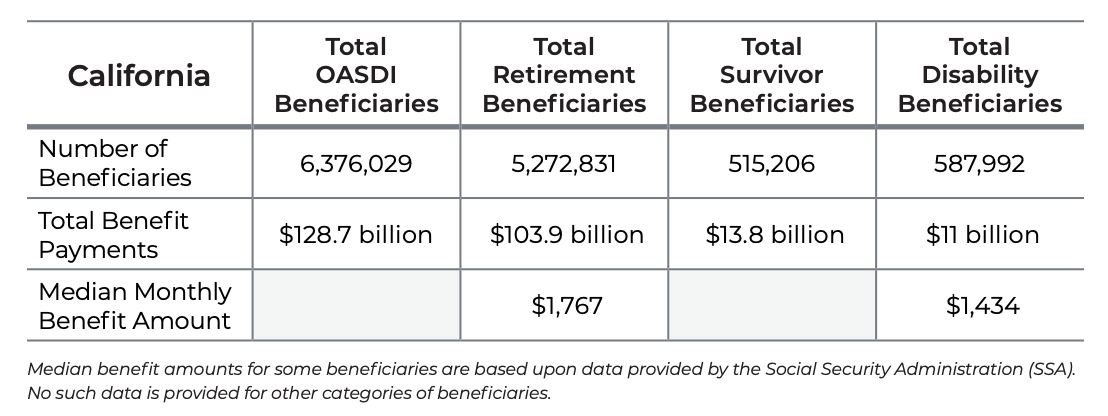|
|
Report: Social Security Provides a Significant Boost to State and Local Economies |
|
Social Security’s economic impact continued to rise in 2023, according to a new report from the National Institute on Retirement Security (NIRS) entitled “Quantifying the Economic Impact of Social Security Benefit Spending.”
The report determined that in 2023 alone, Social Security’s impact on the U.S. economy was $2.6 trillion. More than 67 million Americans received $1.37 trillion in benefits, while approximately 12.2 million domestic jobs were supported by the program leading to $804.6 billion in income. This combined created tax revenues of $363 billion, while $1.6 trillion was added to the GDP. |
|
The NIRS report includes state fact sheets that illustrate Social Security’s economic impact on all 50 states and the District of Columbia. |
|
|
Overall, every dollar spent on Social Security translated to $2 in economic activity. For example, in California alone, a total of 6.37 million residents received benefits, while 730 thousand jobs were supported by Social Security.
“These findings affirm how important Social Security is to our entire country,” said Robert Roach, Jr., President of the Alliance. “These earned benefits are spent and invested back into our local economies. More than ever, it’s crucial to protect and strengthen this vital institution.”
More data, including 51 fact sheets and a recorded webinar, can be found here. |
|
Only One Week Left for Medicare Open Enrollment |
|
Medicare beneficiaries have until December 7 to enroll in new plans or change their coverage. During this time, patients can assess changes in their current plans and other plans offered in their area. They can also choose different or new coverage based on their needs.
Research has shown that many seniors don’t even compare plans – let alone change coverage – during open enrollment. But health care costs have risen in the last year and are expected to continue to grow next year. Medicare Part B premiums will increase by 9.7 percent, further compounding expenses for seniors. Advocates say that’s why it’s even more urgent for beneficiaries to find coverage that fits their needs and budget.
Experts say that older Americans should pay special attention to how their current plans might change or how new coverage might differ from their current coverage. Many Medicare Advantage and Medicare Supplement plans are increasing the maximum amount that beneficiaries have to pay out-of-pocket for their care next year. Patients might lose access to their preferred providers and/or see fewer Part D and patient preferred organization (PPO) plan options.
For seniors who are confused about how to navigate open enrollment, State Health Insurance Assistance Programs provide unbiased guidance. Find your local SHIP office here.
|
|
Retirees Welcome Second Round of Lower-Priced Drugs Negotiated Under the Inflation Reduction Act |
|
The following statement was issued by Richard Fiesta, Executive Director of the Alliance for Retired Americans, regarding the Administration's announcement of lower, negotiated prices for people with Medicare:
“The requirement that Medicare negotiate lower prices for prescription drugs continues to pay dividends for older Americans and taxpayers. Today’s announcement of lower drug prices for 15 high-priced drugs is a win for the more than 5 million seniors who take these drugs to treat asthma, diabetes, lung disease, and other serious conditions, and will soon pay less for their medications.
“The 4.4 million members of the Alliance are pleased that the Trump Administration has followed the law, negotiated these prices, and defended this law in court.
“We call on the President to work with Congress to increase the number of drugs subject to price negotiation and use this common sense approach to deliver even more savings for the American people.” |
|
KFF Health News: Kennedy Sharpens Vaccine Attacks, Without Scientific Backing |
|
As the federal government prepares for the next meeting of its Advisory Committee on Immunization Practices, Health and Human Services Secretary Robert F. Kennedy Jr. has intensified his attacks on aluminum vaccine components used in many shots to boost the body’s immune response.
Kennedy, a longtime anti-vaccine activist before seeking public office, claims that aluminum adjuvants are neurotoxic and tied to autism, asthma, autoimmune disease, and food allergies.
But science and medicine advances a different view. Strong recommendations that parents introduce peanut-containing foods to infants early, for instance, have led to a drop in the incidence rate of peanut allergies.
|
|
Happy Thanksgiving from the Alliance |
|
|
Thanks for reading. Every day, we're fighting to lower prescription drug prices and protect retirees' earned benefits and health care. But we can't do it without your help. Please support our work by donating below. |
|
|
|
|
Alliance for Retired Americans | 815 16th Street, NW | Washington, DC 20006 | www.retiredamericans.org



